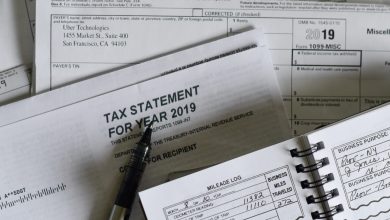8 Overlooked Tax Breaks

Tax season is here, and with it comes a lot of paperwork and likely many missed opportunities to take deductions you didn’t even know existed. No one likes tax season. But everyone loves saving money. So instead of putting off your taxes until the last minute, have some fun claiming these eight overlooked tax breaks.
1. Miscellaneous Tax Deductions
This category used to be a significant source of tax breaks, but many of these miscellaneous items were eliminated in the Tax Cuts and Jobs Act of 2017. While this area isn’t the gold mine it used to be, there are still miscellaneous deductions that you can take advantage of. Let’s start with the ones that were eliminated.
- Theft or personal casualty losses that do not occur in a federally designated disaster zone
- Expenses for hobbies
- Fees incurred while contesting a ruling from the IRS
- Many investment fees, such as management and advisory fees
- Traveling expenses for work that were not reimbursed
- Dues paid to unions
- Personal tax prep fees
While those are gone, the following are miscellaneous deductions that are still available:
- Student loan interest
- Work expenses incurred due to a disability
- Theft and casualty losses on income properties
- Interest paid on a loan to buy an investment
- Gambling losses to offset any winnings
- Federal estate tax from an inherited IRA or retirement benefits

2. Interest Paid on Student Loans
It used to be that no one could get a tax deduction if you got help paying a student loan from your parents or anyone else. The only way to get a tax deduction was to pay the loan yourself, and if the money was given to you, you didn’t qualify for a deduction. But there’s a new rule that applies as long as you are not claimed as a dependent. The new law states that you can qualify for up to $2,500 in tax deductions on student loan interest, no matter who paid the loan.
3. Claim the Earned Income Tax Credit
Millions of people with lower incomes claim the Earned Income Tax Credit (EITC). But the IRS has said that there is still 25 percent of the population that qualifies for this credit and isn’t taking advantage of it.
The Earned Income Tax Credit is technically not a deduction, but a tax credit is more valuable than a deduction because it brings down your tax bill dollar for dollar. For example, if you are in the 33 percent tax bracket, then each dollar of deductions you take is worth $0.33. But with a credit, you’re getting the full amount back.
The amount you can receive back ranges from between $529 and $6,557, depending on your filing status. To be eligible for the credit, you must meet the following criteria:
- You must be between 25 and 64 years old.
- If you’re married, everyone in your immediate family must have Social Security numbers.
- You must file as either an individual or jointly if you are married.
The amount you can receive back in your credit will be dependent on both your family and financial situations, so you are encouraged to look up your eligibility to see if you apply. If you had an investment income of more than $3,600 in one year, you do not qualify for the credit.
An example where the maximum credit applies is if you’re married with three kids and have a total gross income of $55,592 or below. In this case, you can receive up to $6,557.
At the bottom of the spectrum, an individual who makes $15,570 or less with no kids can receive up to $529.

4. Early Withdrawal Penalty
Some investments, such as a Certificate of Deposit (CD), require you to refrain from withdrawing until a defined maturity date. You can still make a withdrawal, but to do so, you will incur a penalty from the bank. While this is not advised, you may have needed the money for any number of reasons, and luckily the penalty you paid can be deducted from your adjusted gross income. You’ll find the penalty on Form 1099-INT or Form 1099-OID.
5. Equipment for Breastfeeding
I bet you didn’t expect to see breastfeeding on a list of deductions, but being a mom pays on your taxes. Some breast pumps can get pretty pricey, and the bill goes up even further with wipes and other supplies. But all breastfeeding-related costs are considered deductible medical expenses.
6. Overlooked Charitable Contributions
If you donated a couch to charity and received a receipt for it, you’re probably not going to ignore that deduction during tax season. But you may have overlooked the gas mileage you used to get there. If you drive your car for a charitable purpose, don’t forget to deduct the standard $0.14 per mile. Another example is if you volunteer at an animal shelter and bought dog treats, those are deductible as well. Maybe you baked a big pasta dish for a homeless shelter; the cost of those ingredients is another deduction you can take.

7. Mortgage Refinancing Fees
When you first buy a house using a mortgage, you’re allowed to deduct all your mortgage points at once. But when you refinance, you’re only allowed to deduct a fraction of those points each year. If it’s a 30-year loan, you can deduct 1/30 worth of points. For example, if you pay $1,500 per year in points, you can deduct $50 that year. But when it comes time to pay off the loan, either by selling the house or refinancing again, you can deduct all of the points not yet paid, as long as you aren’t refinancing with the same lender.
8. Tax Break for Dependents
If you have kids, you’ve likely been deducting $2,000 a year for the child tax credit. But when your kids turn 16, they no longer qualify for that credit. While the amount isn’t as high, you can still deduct $500 for dependents that don’t qualify as a child. This includes credits for kids in college, as well as for elderly relatives in your care. The only disqualifier for this credit is if you make more than $200,000 a year as an individual, or over $400,000 if you’re married and filing jointly.



